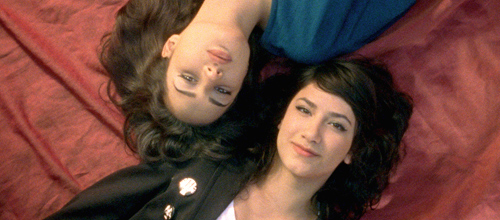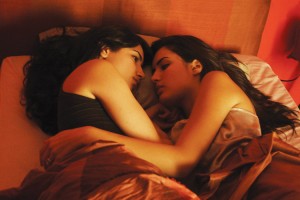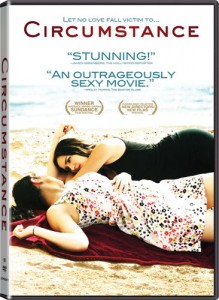Think It’s Difficult in America?

‘Circumstance,’ a progressive, lesbian-themed film, is set in Iran
by Nancy Ford
Photos by Brian Rigney Hubbard
Circumstance, a recent film by Maryam Keshavarz, is a story of oppression, compliance, defiance, and addiction. As if those themes weren’t harrowing enough all by themselves, it’s also about young lesbians in love in one of the most inhospitable places for lesbian love to grow: Iran.

Atafeh and Shireen find themselves entrenched in the strict traditions of their Muslim heritage, yet drawn to 21st-century culture and its Western influences. Their burgeoning love for each other is as irresistible as is it deadly.
Growing stronger each time they are together, their attraction is undeniable, but privacy is impossible: Big Brother is very much alive in their world, literally and figuratively. Nothing good can come from their passion—but tell that to two hormone-driven teenage girls.
Shot in Lebanon (since Iran has laws discouraging the sort of behavior represented in the film), director Keshavarz deftly delivers the film’s message that any and everyone must make the best of our circumstance, or do what we can to change it.
“Even shooting in a liberal country, like Lebanon, was still difficult,” Keshavarz says. “It is still illegal to be gay there. Also, there is a lot of tension in the country. The film is sort of a love poem to strong Iranian women, who in their daily lives and small acts stand up against the state.”
But isn’t it the tension exactly what makes any good love story irresistible?
Prior to its theatrical release, Keshavarz discussed the challenges and triumphs of making such a controversial film with a corps of journalists. OutSmart was among them.

How much of the film is autobiographical?
Maryam Keshavarz: It is not an autobiographical film, but the girls navigating the underground world is my experience as a teenager with my cousins. The structure of the family is based on a very liberal uncle I had that was at a university in America, went back to Iran in 1979, and got stuck there. Since he was very liberal, I wondered what it was like for him to raise his family in a very liberal environment.
As a filmmaker, did you run into backlash or difficulty making the project?
There was a lot of risk in making the film. I had serious discussions with the actors that we likely couldn’t go back to Iran after making the film.
What has the reaction to the film been in Middle Eastern countries?
Unfortunately, we cannot show the film in Middle Eastern countries. The only countries that will show the film are Turkey and Israel. But we are trying to screen in other countries soon. There have been a lot of Middle Eastern immigrants who have seen the film, and their reaction has been mostly positive, but some extremely negative. In terms of the young Middle Eastern and gay Middle Eastern, it has been extremely positive.
What has been the response from the gay community?
The response in the gay community has been amazing. We won the Audience Award at Outfest and the Jury Award at New Fest.
Are there any specific films or filmmakers you modeled the film after? Or was it mostly intuitive or organic?
I love Lucrecia Martel and Atom Egoyan.
How important was the influence of director Marjane Satrapi [Persepolis] on you?
I think Marjane and I both speak to a lot of Irani’s experiences. I think what she did—the broad historical analysis of a little girl—was only possible in animation.
Were you pressured at any point to walk your audience more explicitly through Iranian history and social context?
I trusted the audience in making the film. In terms of when I write, I try to write scenes that resonate with me both as an Iranian and an American. I wanted people to feel the social context, not necessarily be told about it. We painted those strokes with camera and music. There are specific references to political ideologies [including scenes from Milk, starring Sean Penn].
Did you always plan for dance and music to play such central roles?
Yes, music has always been a major character in the film, especially the use of Persian hip-hop in contrast to the Persian classical music. In the beginning of the film, there is a lot of music and joy. As the environment becomes more oppressive, the music that does appear is discordant. Gingger Shankar and I worked on the music cues even before we shot the film.
How open is the broader society to that kind of Persian hip-hop? Does it ever tackle these subjects directly in the music socially?
Persian hip-hop is highly political. It’s all underground, but the lyrics are very political and it’s very popular with the young people in Iran. [The soundtrack was released in November and is available via download.]
Can you talk about your upbringing, please? Are you able now to go back to Iran?
I grew up going between New York and New Jersey, and Shiraz. Since my parents came to the United States in 1967, I never had any issues going between countries. I had two passports. My uncle was killed in the war between Iran and Iraq. Because of this, my mom moved my brother and I back to Iran, so I actually went to second grade in Iran. I also did some of my graduate work at the university in Iran. I love that toggling back and forth.
Were there any specific challenges or issues with filming in the Middle East, or was production ever halted?
I’ve shot two films in Iran before, so I know shooting in the Middle East is a very delicate matter. It’s about flying under the radar and picking the right team. We encountered some obstacles in terms of shutting down the production, but we were able to overcome them.

We don’t know at the beginning of the film what the private school’s headmistress means by “people like you” and how it raises issues of wealth and class. Can you say more about that?
“People like you” refers to Shireen’s parents’ political background; she’s been marked because of this. In terms of class, the film shows that the girls are in parallel paths until they are arrested. This is where circumstance and class comes in to play: Atafeh’s parents can buy her way out, but Shireen’s choices are much more limited.
Did you specifically try to find a beautiful cast?
Casting was a huge problem. I auditioned over 2,000 girls for the roles of Atafeh and Shireen. I was looking for girls that were over 18, but looked under 18, had two passports, were good actors, and weren’t afraid to tackle the subject matter in the film. It’s both girls’ acting debuts.
What are men most afraid of, in regards to women in a culture like Iran?
Women in Iran is a touchy subject. Because it’s an Islamic state, women occupy a largely symbolic position in the culture. If women show too much of their hair or dress too promiscuously, this is an assault on the state. Women are largely more harassed in the culture. But it also creates very strong women as a result. The film is sort of a love poem to strong Iranian women, who in their daily lives and small acts stand up against the state.
Given the environment, why is there not a mass exodus of women?
That’s not to say women don’t create their own spaces for freedom of expression. You have a sense in the beginning of the film that despite all the surveillance cameras, the girls have found a way to still live their lives. They ride around in the city, still see their ➝ friends—like typical teenagers. The family has done quite well for itself. The mother is a successful surgeon. So in any oppressive environment, safe spaces are created. But I was trying to evaluate, when are those safe spaces compromised?
Surveillance cameras have become a way of life in all countries and cultures. How do you think this changes us fundamentally as human beings?
It’s only when the threat comes from within that tragedy strikes. It’s when the brother brings the state, or surveillance, into the sanctuary of the home that everything starts to fall apart.
Are you comfortable with viewers seeing Mehran’s [one of the characters] new-
found fundamentalism as its own form of addiction?
Mehran’s not truly a fundamentalist. He’s attracted to religion because it comes with power in Iran. His extremism is another form of articulating his addictive character. But he’s quite lost and lonely. He’s disempowered. I don’t see him as a villain—just as someone trying to find his place in the world.
Circumstance is available on DVD from Lionsgate (lionsgateshop.com).










